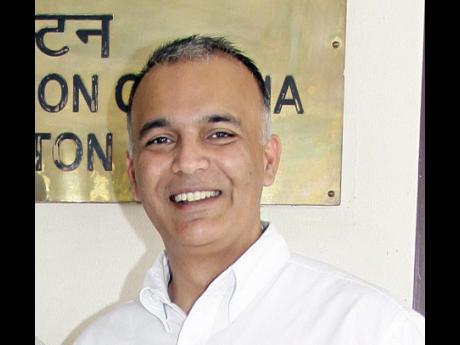Reaping what you sow - Students get heads up on agriculture practices
"Do you know what this is?" asked Evan Adams, Peace Corps volunteer, as he raised a plastic soda bottle to a group of grade three Wilmor Prep School students standing in a circle with him under a tree.
Some curious stares, some plausible perceptions of what the concoction in the bottle could be. "Compost," was the response.
The ensuing explanation that compost is developed by bacteria made students wince.
"Eew!" was the response in unison, but Adams explained that not all bacteria was 'bad' and gave the children the task of making their own compost: one dried leaf, one green leaf mixed up with mud.
Recycled bottles were passed around, and the students ran to collect their bounties in the quadrangle that comprises a kitchen garden planted on discarded tyres.
Students of this Santa Cruz,
St Elizabeth-based school are slowly warming up to the idea of trying their hand at tilling the soil.
"These kids have the knowledge to manage a herb garden," said Adams. "It is great to see them learn and also be enthusiastic in what they are doing."
It is a holistic process with the students getting hands-on knowledge about agriculture. Going alfresco is one such approach.
Teaching the students to care for their surroundings, respect the environment, and recycle and reuse to the optimum, Adams said, are the key focus areas.
Adams works on gardening and agriculture, promoting them as activities that can be enjoyable as opposed to punishment for children.
Students are able to reap what they grow, and food is used in school lunches so that they are able to see the fruits of their labour.
Adams is minimising his carbon footprint by riding a bicycle.
He went around the neighbourhood to car-repair shops and hauled discarded tyres to the school they were getting a new lease on life.
"We wanted to help children to appreciate the process of how food is made," said founder and principal of Wilmor Prep Thelma Morris, adding that she was enthused by Adams' work in agriculture. She is happy that it has been introduced to her school.
Adams' interactions go beyond agriculture.
He is giving a heads up to the students on agriculture practices and how schools work in the United States.
"I talk to them about the American culture, what we do at schools, and how those best practices can be emulated locally," Adams said.
This little patch of land, in the breadbasket parish of Jamaica, answers a billion-dollar question: How can the world nourish 9.8 billion people by 2050 through sustainable practices?
According to the World Economic Forum, food systems currently do not provide nutritious food in an environmentally sustainable way to the world's population.
MILLIONS UNDERNOURISHED
Nearly 800 million people are undernourished, while 1.2 billion are overweight or obese.
Evans started working with Wilmor Prep in September 2016 when Morris met him at a farmers' cooperative meeting.
Since he has been working with Wilmor Prep, Adams said, the principals of five schools in Santa Cruz have approached him to develop their agriculture programme.
"I wish I had more time at hand," Adams said, "but I do not want to stretch myself thin, and not be able to do justice to what I am doing."
Adams, an agricultural engineer from Georgia, is an environment volunteer working outside of Santa Cruz. The majority of his work is with a local farmers group. He is also involved in environmental education at three schools in the area.
"Jamaicans are very adaptive. They find a way to do things," Adams said. "They are going to push through."
But, he said, that adaptability to academics and how it is evolving worldwide needs to be strengthened in Jamaica.
"It will be good to reinforce the fundamentals in a way that is both fun and effective at the same time," Adams said.
Paradoxically, according to Adams, while the students, in general, expected to be resourceful, their actions are constrained by thinking within set parameters.
"At the end of the day, they are being thrown into a box when they should be thinking out of the box," Adams said. "The process needs to be rethought."
Morris concurs.
"The times have changed," she said. "We are seeing the competition to rush to the top increasing. Children are being pushed to do more, which is challenging and also hard on them."
According to this veteran educator, who has been teaching since 1972, the students need wider experience and exposure to what is happening in the world around them.
"The world is out there for them, and they have to be ready for it," she said.
"It is critical to know where the food we eat comes from, and critically, to know the journey how that food gets from the farm to the table," Morris said, acknowledging the work put in by the teachers and her ancillary staff, Mazie Henry and Novelete Samuels, who work to keep the institution running smoothly.
Adams is happy with the progress of the students, too.
"I was amazed at the level of interest of the students," he said. "If given the right tools, they can do wonders."
But, he said, this exercise should not merely be a fun day in the yard at the school.
"The perception that agriculture is just about 'getting your hands dirty' needs to change," Adams said. "Many agriculture professionals in the US are in corporate jobs and managing their farms."
His next lesson might be to talk about earthworms. Do we hear 'eew' already?
The visit to Mt Providence Primary School, Clarendon, and Wilmor Prep School, Santa Cruz, St Elizabeth, was facilitated by the Peace Corps.








